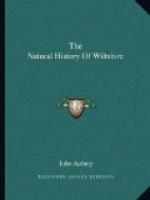Me. Baynham, of Cold Ashton, in Gloucestershire, bred an attorney, sayes, that an hundred yeares since there were in the county of Gloucester but four attorneys, and now (1689) no fewer than three hundred attorneys and sollicitors; and Dr. Guydot, Physician, of Bath, sayes that they report that anciently there was but one attorney in Somerset, and he was so poor that he went a’foot to London; and now they swarme there like locusts.
Fabian Philips tells me (1683) that about sixty-nine yeares since there were but two attorneys in Worcestershire, sc. Langston and Dowdeswell; and they be now in every market towne, and goe to marketts; and he believes there are a hundred.
In Henry 6th time (q. if not in Hen. 7?) there was a complaint to the Parliament by the Norfolk people that whereas formerly there were in that county but five or six attorneys, that now they are exceedingly encreased, and that they went to markets and bred contention. The judges were ordered to rectify this grievance, but they fell asleep and never awak’t since. — Vide the Parliament Roll. [See the above note. In page 12 (ante) Aubrey states that the Norfolk people are the “most litigious” of any in England. — J. B.] ’Tis thought that in England there are at this time near three thousand;* but there is a rule in hawking, the more spaniells the more game. They doe now rule and governe the lawyers [barristers] and judges. They will take a hundred pounds with a clarke.
[There are now upwards of three thousand attorneys in practice in the metropolis alone, to whom the celebrated remark of Alderman Beckford to King George the Third may be justly applied, with the substitution of another word for “the Crown”, — “the influence of lawyers has increased, is increasing, and ought to be diminished.” - J. B.]
PART II.-CHAPTER XVII.
Offatalities of families and places.
[Nearly the whole of this chapter, with some additions, is included under the head of “Local Fatality” in Aubrey’s Miscellanies. 12mo. 1696.-J. B.]
“Omnium rerum est vicissitudo”. Families, and also places, have their fatalities,
“Fors sua cuiq’ loco est.” Ovid, past. lib. iv.
This verse putts me in mind of severall places in this countie that are or have been fortunate to their owners, or e contra.
The Gawens of Norrington, in the parish of Alvideston,
continued in this place four hundred fifty and odd
yeares. They had also an estate in Broad Chalke,
which was, perhaps, of as great antiquity. On
the south downe of the farme of Broad Chalke is a
little barrow called Gawen’s-barrow, which must
bee before ecclesiastical lawes were established.
[Aubrey quotes a few lines from the “Squire’s
Tale” in Chaucer, where Gawain, nephew to King
Arthur, is alluded to.-J. B.]
___________________________________




